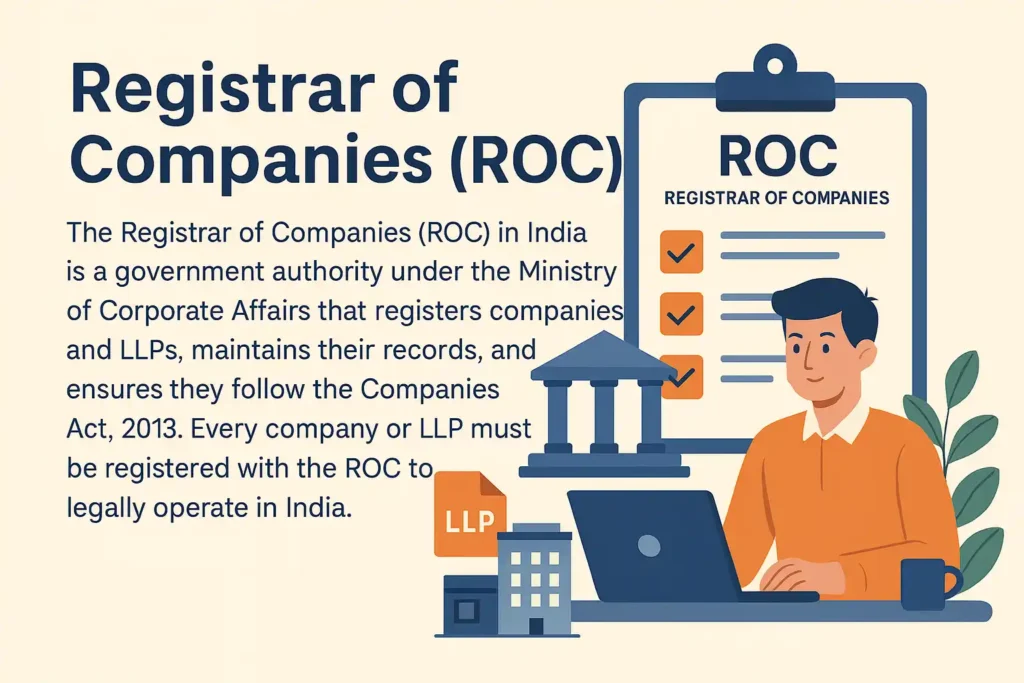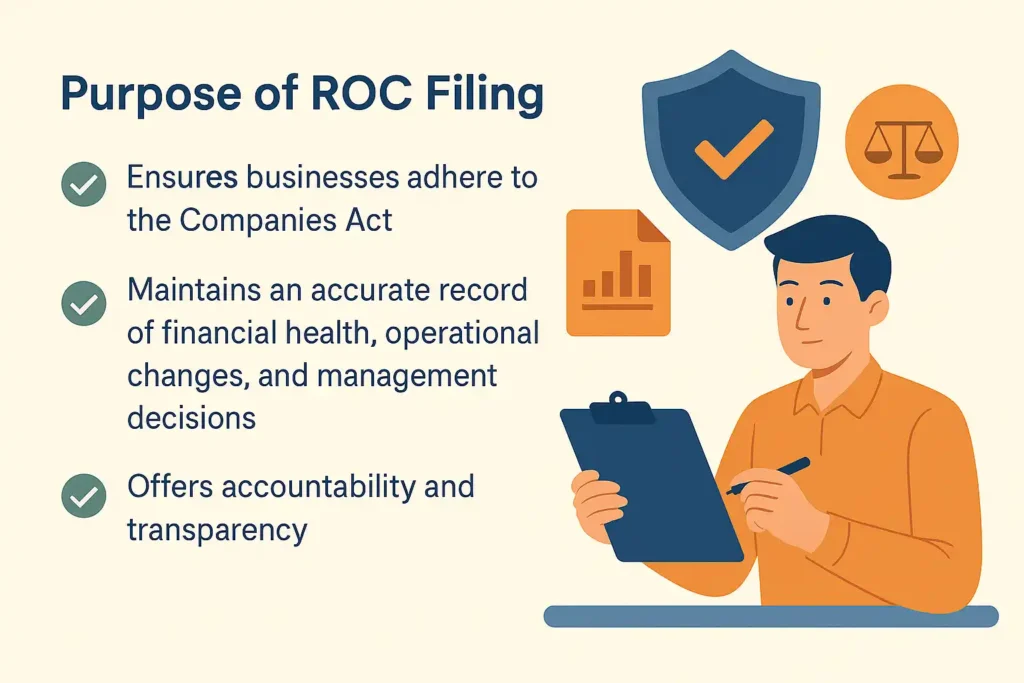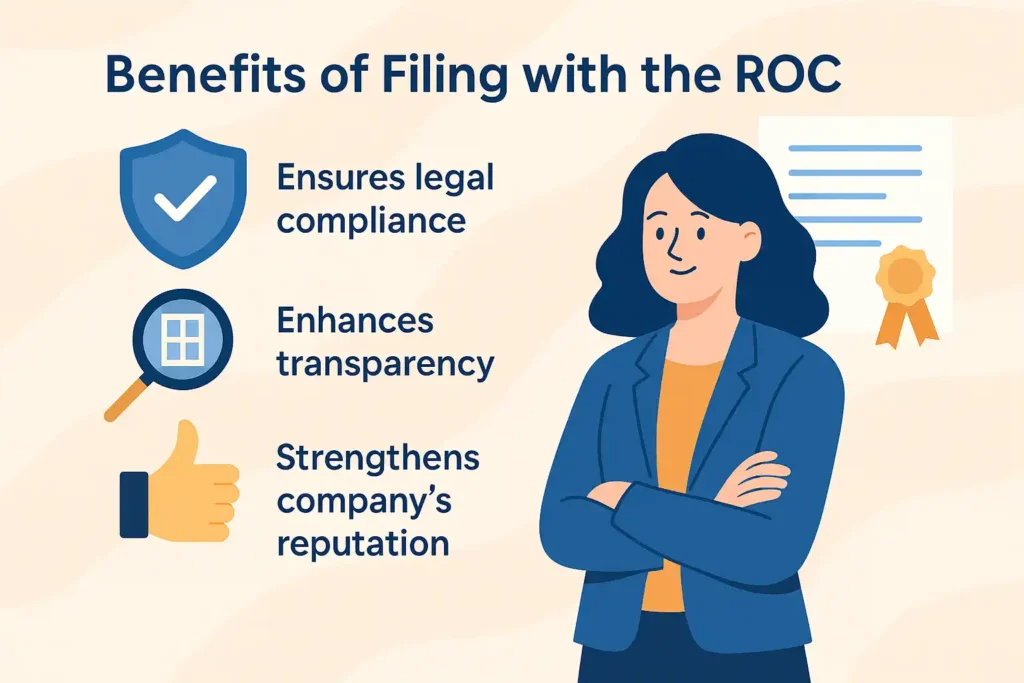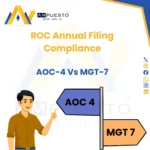The Registrar of Companies (ROC) plays a vital role in the business ecosystem by ensuring that companies operate within the legal framework. Understanding the ROC’s function in company registration is crucial for maintaining compliance and supporting business growth, whether you are an experienced entrepreneur or launching your first venture.
Introduction to the Registrar of Companies (ROC)

In India, the Ministry of Corporate Affairs (MCA) oversees the Registrar of Companies (ROC), a government body responsible for registering Limited Liability Partnerships (LLPs), Private Limited Companies, and other business entities across the country. Each company or LLP operating in India must be registered with the ROC to legally conduct business. The ROC ensures that these entities comply with the legal requirements set out in corporate regulations.
The Role of ROC in Ensuring Legal Compliance for Businesses
Legal compliance is a top priority for businesses, and the ROC acts as a key regulator in this area. By mandating the timely submission of essential documents—such as financial statements, annual returns, and notifications of directorship changes—the ROC ensures that businesses adhere to the law. Without the oversight provided by the ROC, companies may face legal challenges, penalties, or even liquidation.
Understanding ROC’s Role in Company Registration
Companies registered under the Companies Act of 2013 fall under the ROC’s jurisdiction. Each ROC office, located in various states and union territories, has authority over companies registered in its respective region. The ROC serves as a repository of company data, promoting operational transparency and regulatory compliance.
How the ROC Maintains a National Registry of Companies
One of the ROC’s key responsibilities is maintaining a national registry of businesses. This database contains crucial information on each registered entity, including details about directors, financial status, and operational specifics. The registry promotes transparency and provides stakeholders and investors with access to valuable information about any registered company.
Purpose of ROC Filing

ROC filing is a legal requirement that ensures businesses adhere to the standards set out in the Companies Act. The filings maintain an accurate record of a company’s financial health, operational changes, and management decisions. They also offer accountability and transparency, which are critical for all stakeholders, including investors, creditors, and regulatory bodies.
Importance of Timely and Accurate ROC Filings
Accurate and timely ROC filings demonstrate a company’s commitment to legal compliance. Submitting documents like annual returns, financial statements, and changes in directorship not only helps avoid legal issues but also enhances a company’s credibility. Consistent filings reflect well-managed, law-abiding businesses—an essential factor for attracting partners and investors.
Who Needs to Register with the ROC?
Whether managing a large public company or a small private limited firm, ROC registration is mandatory for all. Every company must provide accurate records and updates to the ROC. For instance, public limited companies are required to make their financial records publicly available, while private limited companies must disclose information about their directors and shareholders.
Role of the ROC in Overseeing Company Compliance
The ROC is not only responsible for registering companies but also for monitoring their ongoing compliance. This includes tracking regular filings related to financial statements, share capital changes, and directorship updates. The ROC ensures that companies remain transparent and compliant with the standards outlined in the Companies Act.
Entities Required to File with the ROC
Private Limited Companies, Public Limited Companies, LLPs, and One Person Companies (OPCs) must file with the ROC. These businesses are required to submit annual returns and financial statements, and any significant organizational changes—such as director appointments or resignations—must be reported to the ROC.
Responsibilities of Directors and Company Secretaries in ROC Filings
Directors and Company Secretaries are accountable for ensuring accurate and timely filings. While company secretaries handle day-to-day compliance tasks and documentation, directors are ultimately responsible for the company’s adherence to legal requirements. Failure to submit accurate and timely ROC records can result in penalties for both the company and its officers.
How to Access a Company’s ROC Information
Finding ROC details for a company is straightforward. The Ministry of Corporate Affairs (MCA) website allows users to search for companies by name or registration number. This platform provides information on a company’s registration status, filing history, and other essential details.
Key Online Resources for ROC Information
In addition to the MCA portal, the Business Master Data section on the government’s website is a valuable resource. It offers access to publicly filed documents, ensuring transparency and facilitating convenient information retrieval.
Is ROC Filing Mandatory?
Yes, ROC filing is mandatory for all businesses operating in India. The Companies Act of 2013 requires companies to submit annual reports and other statutory documents to the ROC. Non-compliance can lead to severe consequences, such as fines or the removal of a company from the ROC registry.
Consequences of Non-Compliance with the ROC
Failure to file required documents with the ROC within the specified deadlines can result in substantial penalties. Companies may face fines, increased scrutiny, or director disqualification. In extreme cases, persistent non-compliance may lead to the dissolution of the business.
Benefits of Filing with the ROC

Filing with the ROC has several advantages, including ensuring legal compliance. It enhances transparency, which is essential for stakeholders and investors, and strengthens the company’s reputation. Businesses that maintain a good standing with the ROC are often more attractive to potential investors, as they are perceived as financially stable and compliant with regulations.
Long-Term Advantages of Good ROC Standing
Maintaining a positive status with the ROC offers long-term benefits. Businesses that consistently file accurate documents are regarded as more credible and reliable, enhancing their market position. By avoiding legal troubles and penalties through timely filings, companies can focus on growth and development.
Conclusion
The ROC is a fundamental pillar of legal compliance in company registration. Beyond ensuring proper registration, it plays a crucial role in monitoring ongoing legal adherence. From maintaining accurate company records to fostering transparency, the ROC is integral to the business landscape.
To thrive, companies must meet ROC filing requirements. Compliance not only shields a business from legal challenges but also builds trust and reputation among investors and partners. By staying up to date with filings, companies secure long-term benefits, including growth, transparency, and legal protection.









